Struggling with cluttered WordPress posts? Adding a simple horizontal line can instantly improve readability and give your content a clean, structured look.
Beyond readability, horizontal dividers are also great for highlighting important announcements, promotions, or transitions between sections. They create a natural flow, keeping your readers engaged.
We’ve tested various methods across different WordPress themes and tools, and we’ve learned what works best.
In this guide, we’ll show you 3 easy ways to add horizontal line separators in WordPress. We’ll also share some creative alternatives to enhance your content layout! 🙌
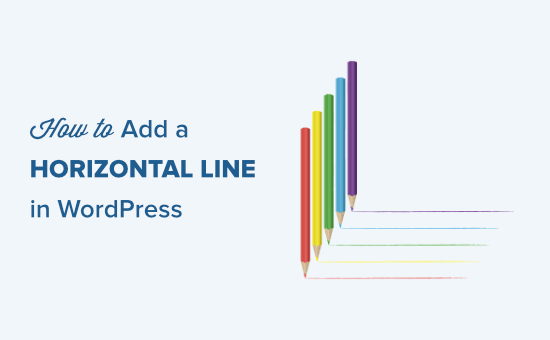
Why Should You Add a Horizontal Line Separator in WordPress?
It only takes seconds for visitors to decide whether to leave your page. Depending on the device, browsers might display your blog post as long walls of text.
Many readers will leave if the content is too difficult to read, even if the blog article is packed with value.
Adding a horizontal line separator could be all it takes to make your content read.
A horizontal line separator can help improve readability and ultimately boost user engagement in your blog posts and pages.
Beyond that, it can highlight key points, which helps emphasize important quotes or transitions within your content.
Since this is a comprehensive guide on how to add a horizontal line divider in WordPress, you may find it helpful to use our table of contents to find the method you would like to use:
Ready? Let’s get into it.
Method 1: Adding a Horizontal Line in the WordPress Block Editor
To add a horizontal line using the WordPress block editor, you can click the ‘+’ icon to add a new block wherever you want the line to be.
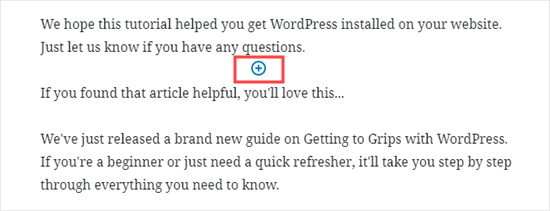
Next, let’s select the ‘Separator’ block from the ‘Layout Elements’ section.
You can find it easily using the search bar.
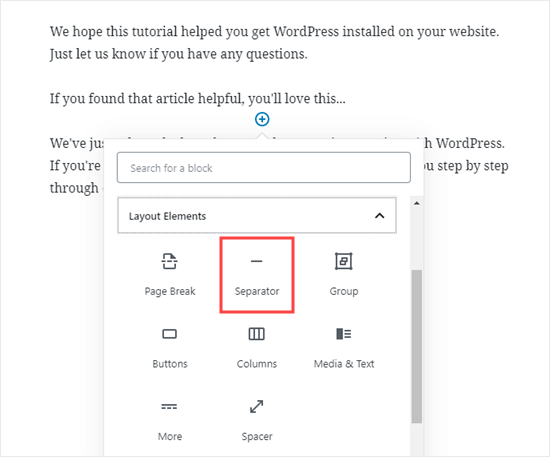
Once added, you’ll see your horizontal line divider in your content area.
Styling the Horizontal Line in the WordPress Block Editor
By default, the horizontal divider is a pale gray line across the center of your post or page.
You can change how it looks by clicking on the line to select its block.
Then, the ‘Block’ editing panel will open up on the right-hand side of your screen.
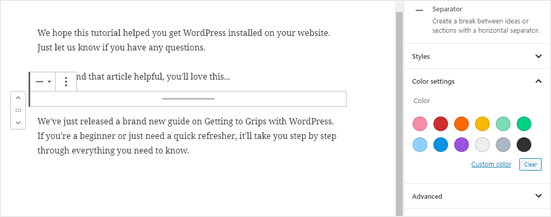
To change the style of your line, just click the little arrow next to ‘Styles.’ Then, you’ll see the different options.
You can change the horizontal line to one of these if you want:
- A wide line that covers the full width of your post’s content.
- Three dots are displayed in the center of your post.
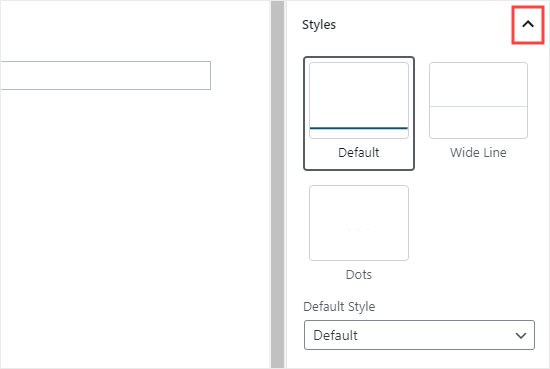
📌 Note: In some WordPress themes, both the wide line and the default line will cover the whole width of your post.
You can also change the color of your horizontal line under the ‘Color’ settings.
Simply click on one of the options displayed or use the ‘Custom color’ link to pick any color at all.
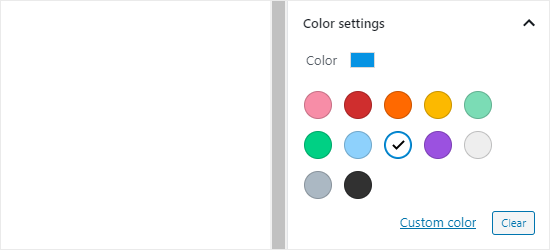
If you want to go back to the default gray color, simply click the ‘Clear’ button under the color options.
Here, our horizontal line is blue and uses the ‘wide’ style.

Method 2: Adding a Horizontal Line in the WordPress Classic Editor
If you’re still using the classic editor, don’t worry; you can still add basic horizontal lines.
To do so, simply edit an existing post or page or create a new one. If you only see one row of buttons in the toolbar above the post editor, then click on the ‘Toolbar Toggle’ icon on the right:
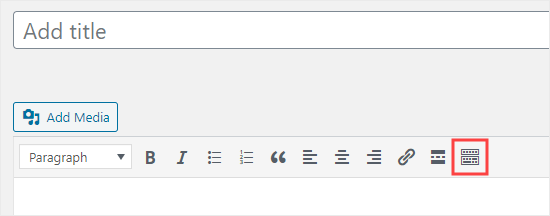
This will open up the second row of buttons, which includes the horizontal line option.
Now, go ahead and put a line break between the paragraphs where you want the horizontal line to go.
You can then click the ‘Horizontal Line’ icon. It’s the second from the left on the second row:
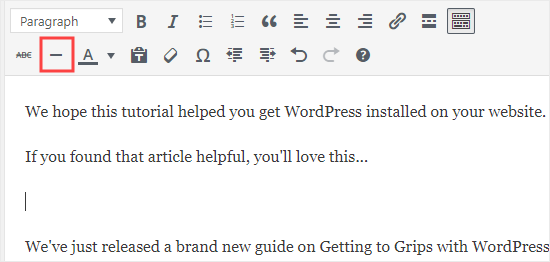
Once added, you’ll see a light gray horizontal line.
It’ll cover the whole width of your post like this:

Manually adding a Horizontal Line divider using HTML
In some rare cases, you may need to manually add a horizontal line divider in your WordPress content.
If so, you can simply do that by using the hr HTML tag in your content:
<hr>
This will add the horizontal line separator to your post content.
Method 3: Adding a Page Break in WordPress Forms Using WPForms
What if you want to put a break not in a post or page but in a WordPress contact form? You can do that, too!
For this guide, we’re going to be using WPForms, the best online form builder on the market.
In fact, WPForms is the tool we love and use ourselves, so we highly recommend that you consider it. For more information about the plugin, hop over to our full WPForms review guide!
First, you’ll need to download, install, and activate the WPForms plugin. If you’re not sure how then just check out our step-by-step guide on how to install a WordPress plugin.
Next, you can go to WPForms » Add New from your WordPress dashboard.
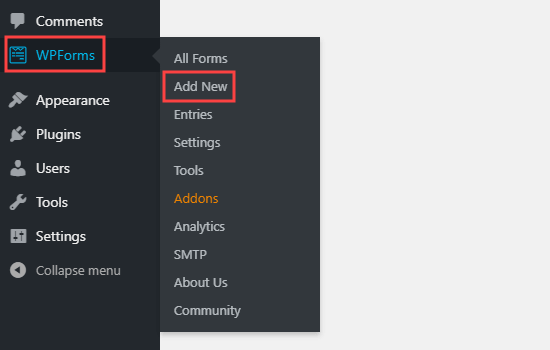
On the next screen, you’ll enter a name for your form, then pick a template.
For this tutorial, we’re going to use the ‘Request a Quote Form‘ template.
After choosing a template, you can simply run your mouse cursor over the template and click the button to create your form.
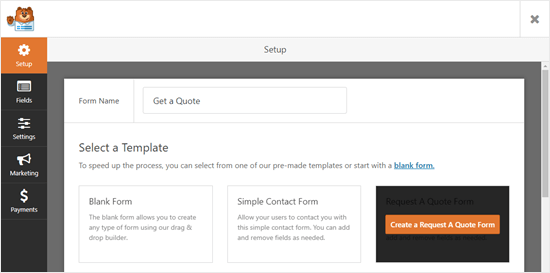
Next, let’s scroll down the ‘Add Fields’ tab on the left-hand side to the ‘Fancy Fields’ section.
Then, you can drag and drop the ‘Page Break’ to wherever you want it on the form. We’re putting it just before the ‘Request’ box.
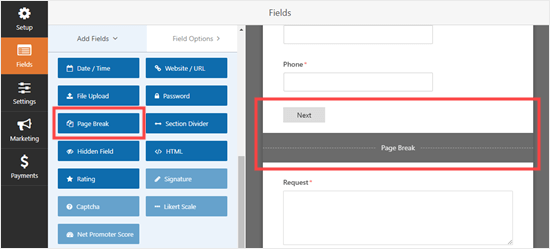
💡 Pro Tip: Want to quickly build your form? Then you’ll appreciate the WPForms AI-powered form builder! Simply give a short description and wait for the AI to generate your form.
You’ll see that the form is now broken into 2 parts. WPForms has automatically added a ‘Next’ button, too.
You can change the ‘Next’ label if you want to, and you can add a ‘Previous’ button for users to go to the second page of the form.
Just click on the page break field to edit it.
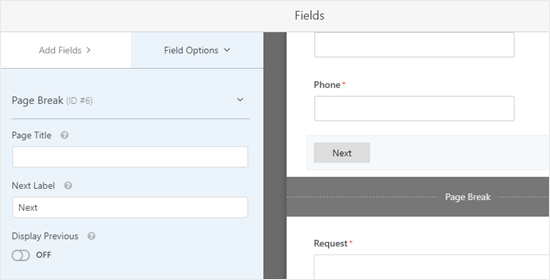
Once you’re done, you can save the form by clicking the ‘Save’ button on the top right.
Now, it’s time to add the form to your website.
Go ahead and click the ‘Embed’ button right next to the ‘Save’ button to get started. This will open a prompt window where you can create a new post or page or edit an existing one.
For this tutorial, we’ll choose the ‘Select existing page’ option.
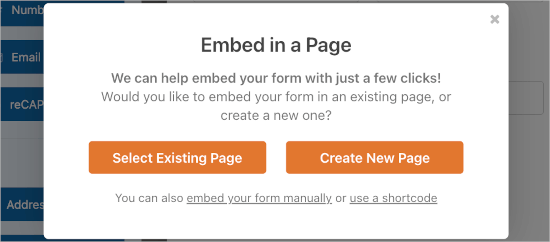
The next step is to choose from the available pages and click ‘Let’s Go!’
You’ll then be redirected to WordPress’ content editor.
From here, simply click the ‘+’ icon to add a new block to your post or page and find the ‘WPForms’ block. You can use the search bar or look in the ‘Widgets’ section.
Once you find it, click on it to add the block to your page.
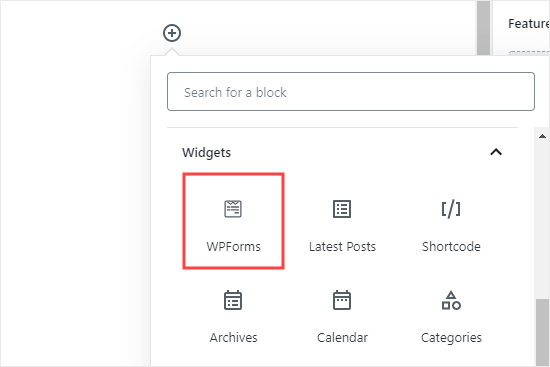
Now, you’ll see an option to select your form.
Go ahead and choose the form you just created from the dropdown list.
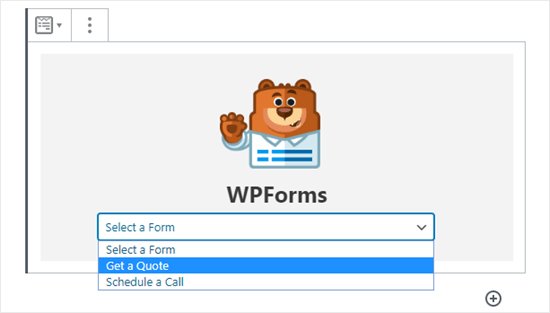
Once you’ve done that, you can publish the post or page. And that’s all there is to it!
Now, if you visit the post or page, you can see the form in action.
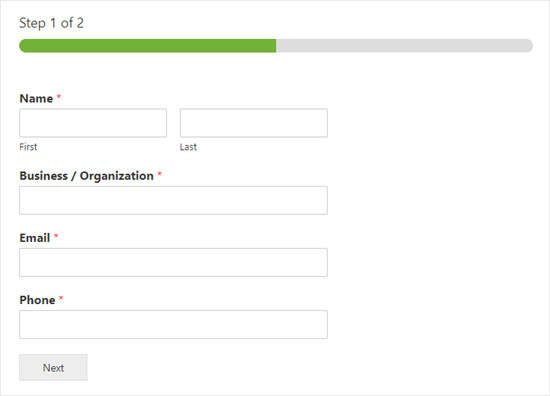
Bonus Tip: Other Separators You Can Use in Your Posts and Pages
The default WordPress block editor allows you to add multiple types of separators to your posts and pages.
Aside from the horizontal line separator, the other options in the ‘Layout Elements’ set of blocks include the ‘Spacer,’ the ‘More’ link, and the ‘Page Break’ blocks.
The Spacer Block
The ‘Spacer’ block lets you add white space between blocks.
For instance, if you want a slight gap at the end of your post before a special offer, you can use ‘Spacer.’
Here’s how it looks when you’re creating your post in the block editor:

You can customize the height of the spacer to fit your content area better.
And here’s how the spacer might appear on your site:

The More Block
If your theme shows full posts on your main blog page instead of excerpts, adding a ‘More’ link will cut off your post at that point.
This will require visitors to click to read more.
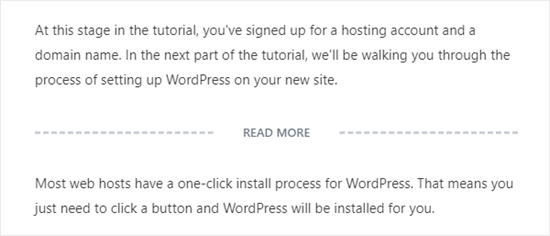
The above image shows what you will see in the content editor.
And below is how it might appear on your site to visitors:

You can learn more about this in our guides on how to properly use the more block and how to easily customize excerpts in WordPress.
The Page Break Block
‘Page Break’ allows you to split long blog posts into multiple pages, but you cannot customize it in any way. Here’s how it looks when you’re creating your post:

Then, ‘Page Break’ will use page numbers and allow readers to choose which page they want to go to.
Here’s how it might appear on your site:

Any of those could be good alternatives to adding a horizontal line in WordPress, depending on your goal.
We hope this tutorial helped you learn how to add horizontal line separators in WordPress. If you want to add more design and layout elements to your posts and pages, check out our article on the best drag-and-drop WordPress page builders or read our blog post on how to create a custom shape divider in WordPress.
If you liked this article, then please subscribe to our YouTube Channel for WordPress video tutorials. You can also find us on Twitter and Facebook.





Jiří Vaněk
May I ask you, if its possible to make dividier horizontal, instead fo vertical?
WPBeginner Support
For that you would want to create columns and then you would use css to add the border property to the columns.
Admin
Shoaib
Does using hr tags between article affect SEO?
WPBeginner Support
It would depend on how they are being used but for the most part they should not have a major effect.
Admin